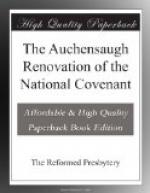This true and unbiassed account of the work in its design, progress and issue we have given, not to pre-occupy false reports only, which we cannot rationally suppose an entire freedom from, unless we fall in with the opposers of our covenanted reformation, and to purchase the good opinion and commendation of men at the rate of losing the favor of God. The main end of relating some of the more material heads, scope and argument of the sermons is because there are some things handled in them which behoved to have been inserted in this preface, to clear up our motives and call to the work, which could not be better done than as the same was cleared then to the people. And this brief relation, though falling short of the matter then delivered, may serve to bring things to the memories of those that found sweet satisfaction in hearing them in the public. As for what may be the observations of censorious critics, either of the sermons in particular, or of the work in general, we are perfectly unconcerned about them, seeing we equally value their approbation or disapprobation; providing true matter of fact be not misrepresented, and so truth injuriously wronged. Nor are we willing here to make any observation of our own concerning the issue and on-carrying of the work, though all the godly there present ought to observe the Lord’s gracious assistance and favor (so far as they found the same afforded to themselves, or displayed in others), lest we may either be in danger to diminish the grace of God by complaining, or incur the suspicion of self-flatterers by commending, but shall leave it to the judgment of such as were then present, and the candid interpretation of others that may read this preceding account thereof.
There have been many objections made against the design, matter and form of the covenants: more against subjects covenanting to defend the purity and promote the reformation of religion, without the royal concurrence of their sovereign princes; most of all against private persons entering into covenant, or renewing thereof, for the said end without the general concurrence of the representative body of the church and state. Those which concern the former two, have been fully answered by the greatest of our reformers, whose piety and learning set them sufficiently above the snarling censures of whatsoever cavilling pens or tongues: As for what are made against the last, they are also answered better than we can pretend to, in the analysis upon the 19th chapter of Deuteronomy, prefixed to the National and Solemn League and Covenant renewed at Lesmahago, whereunto we refer the reader. Only because that book may not be at hand to every one that would desire these objections solved, we shall here transcribe the answers to two or three of the most material of these objections, making but small, if any, variation from the author’s words.
Object. 1. “In all the national covenants whereof we read in scripture, there was still the concurrence of either the sovereign authority then in being, or at least of the Captains, Elders, Officers, and Heads of the tribes; And, therefore, it cannot be done by private subjects, without either royal or parliamentary authority.”




